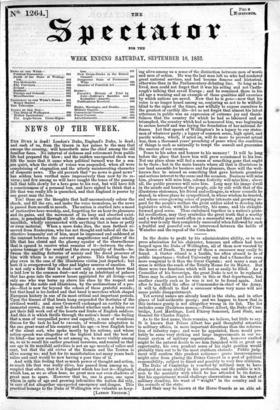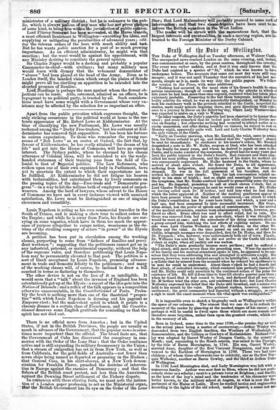In the desire to profit by his administrative ability, or
to ex- press admiration for his character, honours and offices had been heaped upon the Duke of Wellington, all of them now vacated by the decree of Death. To many of these a successor may easily be found. A Garter riband is a bauble too often abused to be of
public importance ; Oxford University find a Chancellor even more congenial to it than the Great Captain; and many a man of sense is within the reach of the Trinity House for its Master. But there were two functions which will not so easily be filled. As a Councillor of his Sovereign, the great Duke is not to be replaced. There may be others not less able in this or that department, but another exactly such as he was is not to be found again. And after he has filled the office of Commander-in-chief of the Army, it will be difficult to find a successor whose very name will not cause public disappointment. Yet several names are already heard in the clubs, and in other places of half-authentic gossip ; and we happen to know that in this instance gossip is not altogether wrong in its list. The list includes some illustrious names,—Prince Albert, the Duke of Cam- bridge, LordVardinmbe, Lord Fitzroy Somerset, Lord Stair, and General Sir Charled :Napier.apier.
As to the first name, there remains, we believe, but little to say. It is known that Prince Albert has paid thoughtful attention to military affairs, in more important directions than the reforma- tion of infantry caps ; and were he appointed, there would pro- bably be some very striking and large improvements in our na- tional system of military organization.But, however exalted might be the natural desire to see him furnished with so great an opportunity, his own prudent sense of his right position would probably turn out to be the most stubborn obstacle. 'Public judg- ment will confirm 'this prudent reticence : grave inconveniences might arise from placing the Prince Consort in a post of political responsibility, subject to direct and possibly to very free criticism. The Duke of Cambridge is vouched by military men to have displayed no mean ability in his profession, and, the public is wit- ness to the assiduity with which be has attended to its duties. But his appointment would challenge observations on his want of military standing, his want of "weight" in the country and in the councils of the state.
Lord Stair may be known at the Horse Guards as an able ad- ministrator of a military district; but he is unknown to the pub- lic, which is always jealous of any man who has not given pledges of some kind, to bring him within the jurisdiction of public opinion. Lord Fitzroy Somerset has been accounted, at the Horse Guards, a most efficient lieutenant to Wellington—executing his ideas, and supplying or mitigating the peculiarities of advanced years ; edit- ing the veteran orders of the hero with much ability and tad. But he too wants public sanction for a post of so ranch growing importance. As an efficient administrator, he might win that sanction; but the want would be against his appomtmeat, with any Ministry desiring to conciliate the general opinion. Sir Charles Napier would be a dashing and probably a popular Commander-in-chief—with civilians • but many military men would learn with dismay that the vehement denunciator of " abuses " had been placed at the head of the Army. Even as to London itself, the bearded vision which swept the plains of Scinde might prove all too startling an apparition to be intruded into the oloseted_Fesence of Routin:e. Lord. Kardinge is perhaps the man against whom the fewest ob- jections can be made. Able, esteemed, admired as an officer, he is repugnant to UQ political party, is trusted by all. Such considera- tions must have some weight with a Government whose very ex- istence may be affected by the selection for so important an Ace.



























